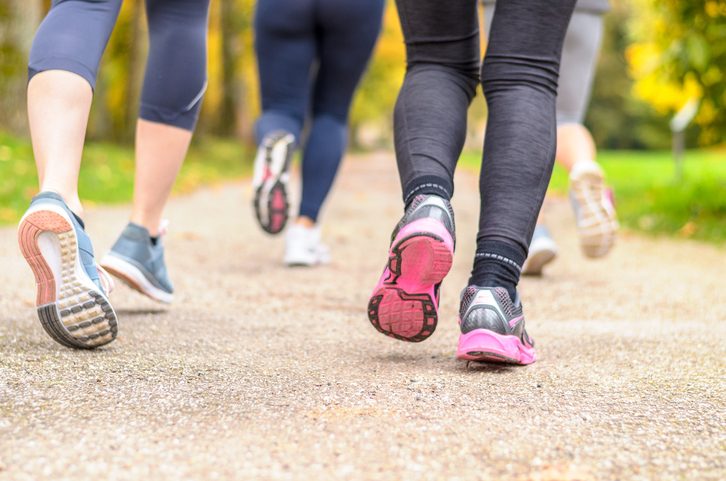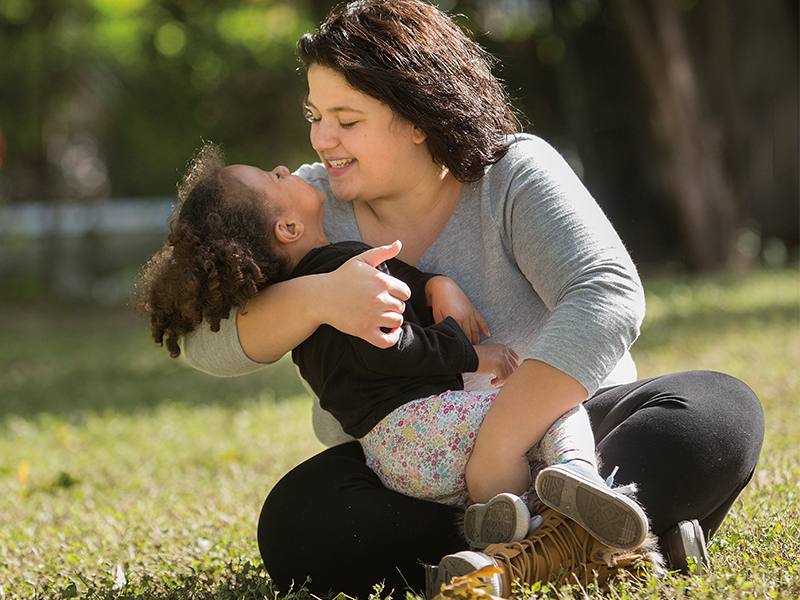Read about Student Appreciation Week, featured books and resources, and more.
Barshop Institute seeks volunteers for molecular study of exercise

Scientists, physicians, and clinical exercise specialists from across the country—including UT Health San Antonio— are embarking on a landmark National Institutes of Health (NIH) effort to find out what happens at the molecular level when people exercise.
The goal of the Molecular Transducers of Physical Activity Consortium, known as MoTrPAC, is to create a comprehensive map of the molecular responses to exercise and its relation to health. Decades of scientific research have shown that exercise is good for people, but science hasn’t revealed exactly why or what happens at the molecular level to produce health improvements.
“Just as we prescribe medicines today based on individuals’ medical and family histories, we will one day prescribe exercise based on patients’ molecular profiles,” said Nicolas Musi, M.D., of UT Health San Antonio, director of the university’s Sam and Ann Barshop Institute for Aging and Longevity Studies. “This study will lay the groundwork for precision exercise medicine, which is the use of exercise as medicine, tailored to individual health needs.”
Dr. Musi, professor of medicine (Division of Diabetes) in the Joe R. and Teresa Lozano Long School of Medicine, is the principal investigator of MoTrPAC’s South Texas site. He also directs the San Antonio Geriatric Research, Education and Clinical Center (GRECC) at Audie L. Murphy Hospital within the South Texas Veterans Health Care System.
Scientists will be able to use MoTrPAC findings to generate hypotheses for future investigations of physical activity’s health benefits. Knowing the molecular basis of those benefits will be powerful. “We will undoubtedly find individual differences. What works for me might be very different than what works for someone else. We want to discover that,” Francis Collins, M.D., Ph.D., director of the National Institutes of Health, said in a prepared statement.
The study will include 1,980 adults and 300 children divided among 11 clinical sites nationwide. Sites include UT Health San Antonio, as well as Ball State University; Duke University; East Carolina University; AdventHealth, Orlando, Fla.; University of Alabama at Birmingham; University of California, Irvine; University of Pittsburgh; University of Colorado, Denver; University of Texas Medical Branch at Galveston; and Pennington Biomedical Research Center at Baton Rouge, Louisiana.
The Barshop Institute seeks to recruit approximately 225 adult participants.
Most of the study participants will be people who don’t exercise regularly. They will be divided into three groups. A group of 70 people will do endurance exercise, 70 will do resistance exercise, and 25 will serve as a control group by remaining inactive. Participants in both exercise groups will receive personal coaching. The exercise groups will go through three one-hour training sessions per week.
There will also be a comparison group consisting of approximately 60 people considered highly active, meaning they work out at least four hours per week.
Scientists will assess participants’ aerobic function, muscular strength and body composition. Researchers will also collect blood, muscle and fat samples, monitor participants’ free-living physical-activity level using wearable devices, and complete participant-reported outcomes and health status by interviews and questionnaires.
For more information on MoTrPAC and how to participate, call the Barshop Institute at (210) 450-3333, visit Barshop Institute clinical trials or write to MoTrPAC-DL@uthscsa.edu. Interested individuals may also review the national MoTrPAC website and watch a video of Dr. Collins discussing the study.
# # #
Stay connected with UT Health San Antonio on Facebook, Twitter, LinkedIn, Instagram and YouTube.
The University of Texas Health Science Center at San Antonio, now called UT Health San Antonio®, is one of the country’s leading health sciences universities. With missions of teaching, research, healing and community engagement, its schools of medicine, nursing, dentistry, health professions and graduate biomedical sciences have produced 36,500 alumni who are leading change, advancing their fields and renewing hope for patients and their families throughout South Texas and the world. To learn about the many ways “We make lives better®,” visit www.uthscsa.edu.
Get a ‘Health Equity Report Card’ on the condition of your community!

By Cliff Despres, Institute for Health Promotion Research, UT Health San Antonio
Wonder what health equity looks like in your community?
Select your county name and get a customized Health Equity Report Card from Salud America! at UT Health San Antonio. This report card will show how your area stacks up in housing, transit, poverty, health care, food and other health equity issues compared to your state and nation.
The Health Equity Report Card auto-generates local data with interactive maps and comparative gauges, which can help you visualize and explore health inequities.
Get your Health Equity Report Card at https://salud.to/equityreport!
“People can easily email their local Health Equity Report Card to decision-makers, share it on social media, and use it to make the case for community change to boost health equity—where everyone has a fair, just opportunity to live the healthiest lives possible,” said Amelie G. Ramirez, Dr.P.H., director of the Salud America! Latino health equity program. Salud America! is funded by the Robert Wood Johnson Foundation and based at the Institute for Health Promotion Research in the Department of Population Health Sciences at UT Health San Antonio.
Salud America!’s Health Equity Report Card uses daily-updated databases from the University of Missouri’s Center for Applied Research and Engagement Systems.
Each report card includes local data, maps and gauges on:
- Housing: Cost-burdened, substandard, affordability, mortgage lending.
- Schools: Graduation, reading proficiency, Head Start enrollment, etc.
- Transportation: Commute times, car-less households, crash mortality.
- Food: Food deserts, food access, food insecurity, fast food, grocery, SNAP.
- Environment: Population density, tree canopy, air toxin exposure, etc.
- Socioeconomic status: Income, poverty, no high-school diploma, violent crime.
- Health care: Uninsured, access to primary, prenatal, mental health and dental care.
- Physical and mental health: Diabetes, heart disease, obesity, asthma, cancer, premature death, Alzheimer’s disease, depression, social-emotional support.
- Comparisons of Latinos to non-Latino Whites: Children in poverty, youth obesity, median household income, high-school diplomas, lack of health insurance, teen birth rates, asthma, infant mortality, cancer mortality and motor vehicle crash deaths.
For example, the Health Equity Report Card for Bexar County, Texas, demonstrates monumental inequities between Latinos and non-Latino whites in the percentage of children in poverty, (27% to 10%), uninsured (20% to 9%), and median household income ($46,079 to $70,203). In housing, it also shows a greater percentage of Bexar County residents are severely housing cost-burdened, face substandard housing conditions, and would have to work 49 hours a week to afford the average-priced two-bedroom home.
Fortunately, each Health Equity Report Card also contains links to evidence-based research and emerging ways local communities are addressing health inequities.
“Advocates can use these report cards to identify gaps in health equity, spur ideas and conversations for healthy change, push policymakers for action, and even get data for research and grant proposals,” Dr. Ramirez said.
About Salud America!
Salud America! is a national Latino-focused organization that creates culturally relevant and research-based stories, videos, and tools to inspire people to start and support healthy changes to policies, systems, and environments where Latino children and families can equitably live, learn, work, and play. Latinos are a rising U.S. powerhouse, but they face barriers to be their healthiest and suffer high rates of obesity and other health disparities. Salud America! and its award-winning multimedia communications help our social and online network—more than 200,000 moms and dads, providers, researchers, and community and school leaders—push for healthy changes in schools and communities to build health equity for Latino and all kids. Salud America! is led by health disparities researcher Dr. Amelie G. Ramirez and supported by a passionate team of communicators at UT Health San Antonio, thanks to funding from the Robert Wood Johnson Foundation and others.
# # #
Stay connected with UT Health San Antonio on Facebook, Twitter, LinkedIn, Instagram and YouTube.
The University of Texas Health Science Center at San Antonio, now called UT Health San Antonio®, is one of the country’s leading health sciences universities. With missions of teaching, research, healing and community engagement, its schools of medicine, nursing, dentistry, health professions and graduate biomedical sciences have produced 36,500 alumni who are leading change, advancing their fields and renewing hope for patients and their families throughout South Texas and the world. To learn about the many ways “We make lives better®,” visit www.uthscsa.edu.
Part II of Cranial Remolding: An intro to the program and the specialist behind it.
In this interview, Jim Brookshier, M.P.O., CLPO, shares his background and expertise in the field. See the video below to learn how he got involved and what he enjoys most about the program.
Ewing Halsell Lecture to feature the ‘Medicine of Music’ with Vijay Gupta
The annual Ewing Halsell Distinguished Lecture will explore “The Medicine of Music,” presented by violinist Vijay Gupta, a MacArthur Foundation “genius” grant winner.
The lecture is at 6 p.m. (reception at 5 p.m.), Thursday, Oct. 17, in Holly Auditorium.
Violinist Vijay Gupta joined the Los Angeles Philharmonic at age 19. Two years later, he began giving lessons to Nathaniel Ayers, a Juilliard-trained musician whose mental illness led to homelessness on Los Angeles’ Skid Row. The experience was life-changing for Gupta, who founded “Street Symphony,” which brings the healing power of music to Skid Row and the Los Angeles County jails. In 2018, Gupta was awarded a MacArthur Foundation “genius” grant for his efforts. In “The Medicine of Music,” Gupta explores the connection between music and mental health, explaining why music’s redemptive power may hold more potential than we realize.
The lecture is presented by the center for Medical Humanities and Ethics. Free and open to the public.
Rivard Report: Separated bike track nears completion in Medical Center
The commute to work or doctor appointments on a central section of Floyd Curl Drive in the South Texas Medical Center is a lot more “green” these days.

